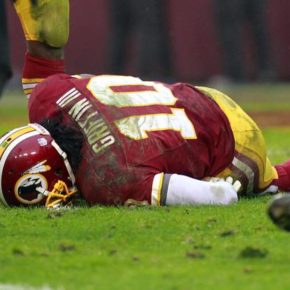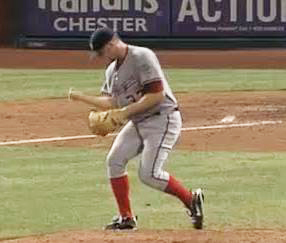I know its been a long time since my last post; I’ve been busier than usual. My brother (and business partner) is on a three week vacation so I’ve been putting in 60-70 hour weeks at our restaurant in Seattle. It’s called Satay and if any of our readers come in and mention this blog, I’ll give them something on the house.
Anyway, there hasn’t been much in the way of Mariners news since I last wrote. The Mariners have been linked to Andre Eithier, and just as quickly un-linked. Then the Mariners were linked to Justin Upton, likewise with nothing to show for it.
So instead of talking about things that haven’t happened or things that most likely will not happen, I am going to branch out and talk about things that actually did happen–and their repercussions. (These things have only slight connection to Seattle, and for this I should be applauded.)
 In case you were under a rock this last weekend, the Seattle Seahawks won their second road playoff game ever, and the first since the Reagan administration. They beat the Washington Redskins pretty handily despite falling behind 14-0 early in the first quarter. However, despite the victory, the biggest story from the game was not the Seahawks’ win, but the Redskins’ loss of Robert Griffin III.
In case you were under a rock this last weekend, the Seattle Seahawks won their second road playoff game ever, and the first since the Reagan administration. They beat the Washington Redskins pretty handily despite falling behind 14-0 early in the first quarter. However, despite the victory, the biggest story from the game was not the Seahawks’ win, but the Redskins’ loss of Robert Griffin III.
RGIII played injured, the team and coaching staff knew about it, and everyone paid the price. During the game RGIII was clearly in pain and after a fall in the first quarter, could barely throw and could not run with his usual gusto. The aftermath of this injury and how it was handled has been all over the internet, with team physician Dr. James Andrews (yeah, that one) and Redskins’ head coach Mike Shanahan facing off in the middle of the blame circle.
That this controversy is unfolding in Washington, D.C. gives it a special irony–and cross-sport relevance–that makes it worthy of discussion on this blog.
 Of course, I am referring to the Stephen Strasburg affair that garnered so much attention for the Washington Nationals. The Ace pitcher underwent Tommy John surgery in 2010, came back to lead the Nationals playoff charge in 2012, only to be shut down in the final weeks of September because of a predetermined innings limit. Strasburg watched from the dugout as the Nationals lost the NLDS in heartbreaking fashion.
Of course, I am referring to the Stephen Strasburg affair that garnered so much attention for the Washington Nationals. The Ace pitcher underwent Tommy John surgery in 2010, came back to lead the Nationals playoff charge in 2012, only to be shut down in the final weeks of September because of a predetermined innings limit. Strasburg watched from the dugout as the Nationals lost the NLDS in heartbreaking fashion.
The aftermath of last weekend’s NFC Wild Card game has many Washingtonians up in arms–and many former naysayers now are applauding what the Nationals did. But does this incident really prove anything? Are the two injuries even related? Should the Redskins have protected RGIII? Or perhaps should the Nationals have played Strasburg?
Let’s first look at the two injuries themselves. RGIII had strained his knee against Baltimore in week 14. He came out of that game and subsequently missed a few weeks, only to come back against the Cowboys and help propel the Redskins to a victory in the Week 17 winner-take-all game. Against the Seahawks last weekend, he re-injured the same knee, to a greater degree, in the first quarter. At this point what we know is that there is an LCL (Lateral Collateral Ligament) tear and an ACL (Anterior Cruciate Ligament) injury (the extent to which will be revealed in surgery to fix the LCL later this week). Strasburg on the other hand tore his UCL (Ulnar Collateral Ligament) in the elbow and underwent Tommy John surgery. He then spent the normal amount of time rehabbing and was cleared to start playing games again after more than a year of sufficient recovery.
So, how similar are these two situations really? On one hand we have a player rushed back form an injury that lends itself to recurrence; on the other hand we have a player who is one hundred percent healthy–at least to the point anyone playing a season of baseball is healthy–and with an injury that has little risk of recurrence under normal circumstances. Strains and sprains are technically small tears, and without surgery they do not heal stronger and are more likely to be injured again. Tommyt John surgery replaces the torn UCL with a tendon from elsewhere in the body–usually the opposite forearm, hip, or hamstring. These tendons, and the precision with which they are attached, greatly reduce the risk of re-injury in Tommy John surgery patients. In fact, the surgery is rumored to increase a pitcher’s velocity.
Suffice it to say, the injuries were quite dissimilar. So what about the teams’ situations? The Redskins were the fourth seed in the NFC playing the fifth seed Seahawks (who had a better regular season record). Washington needed an epic win in its last game to clinch the division title, and would not have made the Wild Card even if they had lost. They were not expected to go very far at all in the playoffs and were the underdog in this home playoff game. Conversely, the Nationals had the best record in baseball during the regular season, were expected to go far in the playoffs, and coasted at the end of the season, still retaining the number one seed in the NL. They were going to play a team that had just battled through a newfangled play-in game and were well positioned to make a run.
Given each teams’ situation heading into their respective fateful decisions, let’s look at the relative importance of each player to their respective teams. RGIII was unquestionably the leader on the team. A rookie, he was voted captain midseason and played the most important position. The Redskins’ offensive playbook was built around RGIII and his semi-unique abilities as both a rusher and a passer. His position necessitated that everything on offense revolve around him, and a removal mid-game would have been a huge blow to the team’s chances of winning. Strasburg was an Ace starter on the best team in baseball, which had one of the best starting rotations in the game. Although an exceptional talent, the Nationals “defensive playbook” was not “built around” Strasburg to any greater extent than all defensive performances rely on the starting pitcher. Also, he was not the leader of the team, he only played once every five games, and would have taken the hill only once in the NLDS.
So where does this leave us? Given what has been said, it is pretty clear that playing RGIII was a great risk to both the team and the player’s future. Further, that his backup had performed fairly well in his absence seems to suggest that playing the clearly injury-affected RGIII may not have been the best move for the team. In addition it is clear that playing RGIII in the playoffs this year did not greatly improve the Redskins chances of winning the Super Bowl, which most fans and analysts would say is better than anything else that could possibly happen. So given all the information, I am confident that I can say that PLAYING RGIII in this game was the WRONG DECISION, even if he did not injure himself and they won the game.
On the other hand, the Nationals are a different story. They had high expectations that they did not succeed in reaching. Not only did they not make the World Series, but they were eliminated in their first playoff series. Their pitching in that series was one of their major problems, giving up a total of 32 runs in five games. Given Strasburg’s condition, there was little to suggest that he was at any more risk of an injury than any other pitcher who had pitched as many or more innings during the season. Remembering that the Tommy John surgery had already occurred and recovery had fully transpired, the risk for his future (and his team’s future) was not greatly increased by his playing at the end of the regular season or in the playoffs. However, the Nationals were possibly losing a less important part of their team. Strasburg is just one of five starters on his baseball team and would have been only one of four (maybe three) starters in the playoffs. His team also performed sufficiently well without him, and were certainly a very good team even in his absence. The Nationals were in a decent position to win whether Strasburg played or not. Still, the Nationals had some reasons that could justify their decision to sit Strasburg, but the reasons for him to play outweighed the reasons for him not to play. I am confident, given all of the information, that NOT PLAYING Strasburg in the playoffs, as well as the end of the season, was the WRONG DECISION.
For what it’s worth though, if the situations had been reversed–if RGIII was nearly/fully recovered, and Strasburg rushing back–each team would have made the correct decision. But that’s not the case, and both teams lost. Better luck next year Washington.
–David Ringold
@dhringold
Stat of the Day: Despite his rampant Seattle homerism, David Ringold is actually a Tampa Bay Buccaneers fan. Tweet him to find out why.












